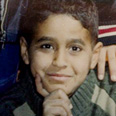
The organs of Ahmed Ismail Khatib, 13, the Palestinian boy shot Thursday by IDF soldiers in the West Bank town of Kabatiya near Jenin, will be donated to six Israelis.
Ahmed was shot after soldiers mistook his toy gun for a real one. Still, his parents decided to donate the organs “for the sake of peace between the two people.”
Meanwhile, the boy’s father said he was invited to meet with Prime Minister Ariel Sharon, who offered to apologize for the killing, Palestinian news agency Ma’an reported.
According to the Palestinian report, Ismail Khatib said that “if this would serve the Palestinian problem and advance a just peace, I will meet with Sharon and bring him a message of peace.”
Ahmed's heart has been transplanted Sunday into the body of a 12-year-old girl at the Schneider hospital in Petah Tikva. His liver was donated to a six-month old baby and a 66-year-old woman at the Beilinson hospital in town.
Ahmed's lungs will be donated to a 14-year-old Cystic Fibrosis patient, and his kidneys to a five-year-old boy and a four-year-old girl.
Chairman of the ADI foundation for the promotion of transplants and organ donation in Israel, Gad Ben-Dror informed Ahmed's parents that Adi intends to grant them NIS 10,000 for their "exceptional deed."
Grants for donors
Israel currently has no law that regulates the issue of granting money to organ donors, although a bill on the matter has been in discussion for over a year.
Members of ADI have been working to advance the bill's approval. For the tme being, the group funds grants to donors' families.
"Because of the complexity of the situation, we decided to contribute money to the Khatib family, although they did not carry our donor card. The whole of society benefits from organ donations, and we have a moral obligation to express significant gratitude, which can also take the shape of a financial contribution," Ben-Dror said.
Ben-Dror said he spoke with Ahmed's uncle, Mustafa Makhamid Sunday afternoon, to inform him of the grant.
"I thanked the family for their donation, and he said they did not do it for the money. I told him it was obvious, because they did not know of the contribution beforehand," he concluded.















